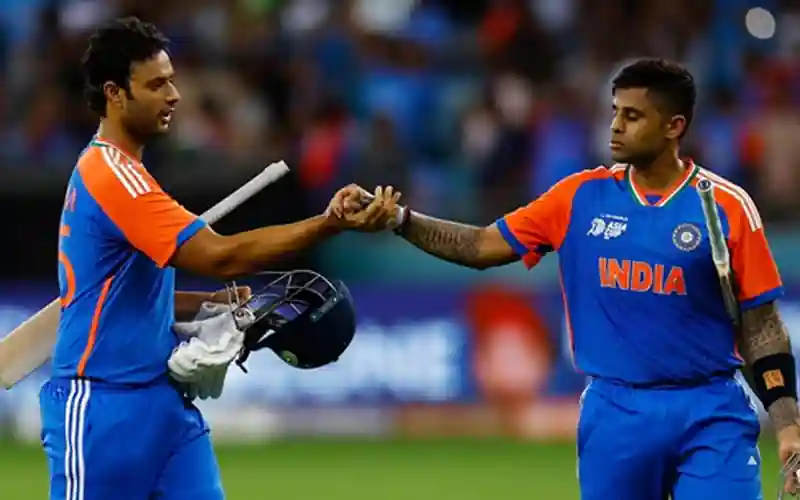The Asia Cup 2025 match between India and Pakistan saw not only an exciting clash on the field but also a significant off-field controversy that has sparked intense debate.
After India’s seven-wicket victory over Pakistan, the actions of Indian captain Suryakumar Yadav and his team drew attention for all the wrong reasons.
The controversy centered around the Indian team’s refusal to shake hands with the Pakistani players, a traditional gesture of sportsmanship, and certain comments made by Yadav during the post-match press conference.
No Handshake Controversy:
In a game as high-stakes as India versus Pakistan, sportsmanship is expected to play a key role in maintaining the integrity of the game.
One of the most iconic rituals in cricket, particularly in international matches, is the post-match handshake.
It symbolizes mutual respect between opposing players and teams, regardless of the result. However, in this encounter, the Indian players did not follow this tradition.
Following the match, instead of engaging in the customary handshake with the Pakistani team and officials, the Indian squad walked straight off the field and into their dressing room.
Reports indicate that the dressing room doors were quickly shut, leaving Pakistan’s squad confused and disappointed by the lack of post-match interaction.
This move was seen as a deliberate snub, drawing widespread attention for what was perceived as a break from the spirit of the game.
Suryakumar Yadav Press Conference:
The situation did not improve during the post-match press conference.
When asked about the refusal to shake hands, Indian captain Suryakumar Yadav defended the team’s actions, stating that “some things are above sportsmanship.”
He further stressed that India was there “to play the game,” a statement that many felt lacked the respect that the sport demands.
He also dedicated the victory to the Indian Armed Forces and the soldiers involved in Operation Sindoor, a recent military operation against their opponent, Pakistan.
While it is not uncommon for players to show solidarity for their country, Yadav’s repeated references to the military operation, especially in a context involving a rival nation, raised concerns.
The mention of a recent conflict between India and Pakistan could potentially inflame tensions, particularly in a sport that is meant to promote unity and camaraderie among nations.
His comments were seen as politically charged and could be viewed as a breach of the ICC’s Code of Conduct, especially given the sensitive nature of the relationship between two neighbouring countries.
Potential Breaches of the ICC Code of Conduct
The International Cricket Council (ICC) has a strict Code of Conduct designed to maintain the integrity of the sport.
The actions of the Indian team could potentially violate several provisions of this code, especially in regard to the refusal of the handshake and the politically sensitive comments made by Yadav.
Refusal to Shake Hands:
The refusal to shake hands with the opposing team and match officials falls under Article 2.1.8 of the ICC Code of Conduct, which prohibits “conduct that is contrary to the spirit of the game” or “brings the game into disrepute.”
Shaking hands after a match is a time-honored tradition that signifies respect, and the lack of it could be seen as a deliberate act of unsportsmanlike behavior.
This action would likely be categorized as Level 1 or Level 2 misconduct, depending on the severity of the violation.
Possible Penalty for Level 1 or Level 2:
Level 1: A warning, reprimand, or a fine up to US$2,000.
Level 2: A fine up to 100% of the match fee and/or demerit points. Accumulating four or more demerit points within 24 months could lead to suspension.
Politically Charged Statements:
Yadav’s comments during the press conference, particularly his repeated reference to Operation Sindoor, a military operation against Pakistan, could be seen as a violation of Article 2.1.7 (public criticism or inappropriate comment).
Politically charged statements, especially those referencing recent conflicts, are strictly prohibited in cricket as they risk inciting hostility and undermining the spirit of the game.
Possible Penalty for Level 2, 3, or 4:
Level 2: A fine of 50% to 100% of the match fee.
Level 3: A more severe fine and/or suspension points.
Level 4: A very serious charge, potentially leading to suspension or a ban from matches, especially if the remarks are seen to have significantly damaged the reputation of the game.
Pakistan Captain’s Boycott post-match presentation
Pakistan captain Salman Ali Agha did not appear for the post-match presentation. While broadcasters did not offer an official explanation for his absence, the timing and context raised questions.
The coach of Pakistan cricket team in the post-match press conference confirmed that Agha’s absence was related to his dissatisfaction with the Indian team’s behavior.
The absence of a handshake and Agha’s absence from the presentation created an atmosphere of tension, further fueling the controversy.
Role of ICC
The ICC’s role in upholding the integrity of the sport is crucial, especially in a high-profile clash like India vs Pakistan.
The Code of Conduct is in place to ensure that players conduct themselves in a manner that reflects the values of cricket, both on and off the field.
The actions of the Indian team and captain Yadav, while perhaps driven by political motivations, could potentially lead to sanctions, depending on how the ICC chooses to interpret and enforce the rules.
If deemed a breach of the Code of Conduct, the penalties could range from fines and warnings to suspension points and bans, depending on the severity of the offense.
This incident serves as a reminder that, beyond the cricketing rivalry, the spirit of the game must always take precedence, and actions that damage the reputation of the sport must not be tolerated.












